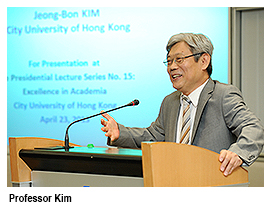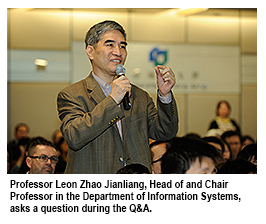Humble accounting and stock price crash
Michael Gibb
?
It is a predicament that challenges the best financial managers the world over: do we release the bad news now and risk the consequences, or do we withhold it, and potentially initiate a financial crisis?
This dilemma provided the cornerstone around which Professor Kim Jeong-bon, Head of and Chair Professor in CityU’s Department of Accountancy, structured his talk, “Humble Accounting, Institutional Infrastructure, and Stock Price Crash Risk” at the latest in the President’s Lecture Series: Excellence in Academic, on 23 April.
This dilemma provided the cornerstone around which Professor Kim Jeong-bon, Head of and Chair Professor in CityU’s Department of Accountancy, structured his talk, “Humble Accounting, Institutional Infrastructure, and Stock Price Crash Risk” at the latest in the President’s Lecture Series: Excellence in Academic, on 23 April.
“Managers have an incentive to strategically withhold, or selectively disclose, bad news and accelerate the release of good news,” said Professor Kim, who is ranked third worldwide based on the number of publications in the top six accounting journals—The Accounting Review, Journal of Accounting Research, Journal of Accounting and Economics, Review of Accounting Studies, Contemporary Accounting Research, and Auditing – A Journal of practice and theory—for the period 2006–2012, according to Brigham Young University in the US.
Such a tendency is part of human nature, as opposed to human wisdom, he said, and could have serious impact on a local or the global economy. “If not disciplined, bad news tends to be stockpiled within a company, and unverifiable good news may create a ‘bubble’, thereby increasing a crash risk,” he said.
In Professor Kim’s work, he has concluded that the best defense against a crash is what he calls “humble accounting”, his version of a conservative approach to the profession. The fundamental principles of his humble accounting are: not to exaggerate your company and to be humble.
“If you are rich, don’t let people know how rich you are!” he joked.
Just as he argued that companies should recognise and report bad news such as losses in an early and timely manner, and should not withhold, hide or hoard information about bad performance, he also warned against recognising good news prematurely and insisted on the need to verify information before making any announcements or taking action.
“Humble accounting prevents bad news from hoarding and accumulation within companies, and can reduce the risk of a stock price crash,” he said.
His research hypothesis is that the degree of accounting being humble or conditionally conservative is negatively associated with the likelihood of future crash occurrence. This idea stems from his own definition of accountancy as the science of value, which he views from three new perspectives:
· economic agents or entities create economic value or wealth via production, sales, financing and investment activities.
· accounting is a process of aggregating these value creating activities into observable, verifiable, and quantifiable measures.
· accounting as an academic discipline is a science of value: value creation, aggregation, measurement, and distribution.
His focus on financial crash and risk is bound up with his argument that crashes teach us a great deal, but the price we pay can be high.
“Human beings in general and policy makers in particular have a tendency to learn more from extreme high-impact events, or they have a tendency not to learn until after crashes occur,” he said.
Through a wiser approach to accounting, i.e. by determining to provide observable, humble, verifiable, reliable, auditable, and credible accounting numbers, economic growth is less likely to be hampered by financial crashes.

